- Geoff Harvey
- Albanian
- Macau
- John McCabe CBE
- Olivier Messiaen
- Gunther Emmerlich
- Sheku-Kanneh Mason
- Reijo Tunkkari
 DISCUSSION: What is a work? John Dante Prevedini leads a discussion about The performing artist as co-creator, including contributions from Halida Dinova, Yekaterina Lebedeva, Béla Hartmann, David Arditti and Stephen Francis Vasta.
DISCUSSION: What is a work? John Dante Prevedini leads a discussion about The performing artist as co-creator, including contributions from Halida Dinova, Yekaterina Lebedeva, Béla Hartmann, David Arditti and Stephen Francis Vasta.
PROVOCATIVE THOUGHTS: 
The late Patric Standford may have written these short pieces deliberately to provoke our feedback. If so, his success is reflected in the rich range of readers' comments appearing at the foot of most of the pages.
San Francisco's Starry Rusalka
JAMES SOHRE sends the last of
three reports from San Francisco Opera
The venerable San Francisco Opera should be justifiably proud of the overwhelming Dvořák production that currently inhabits its stage, a Rusalka monumental in its visual sweep, unerring in its musical excellence.
It is impossible to write about anything else until it is acknowledged that first and foremost, the performance was the occasion for the overwhelming title role debut by the luminous, incomparable Rachel Willis-Sørensen.
Her triumph was instant and total. The passionate, haunting rendition of 'The Song to the Moon' was the first of many unforgettable moments, imbued with mystery and creating many a frisson in reaction to jaw-dropping, controlled vocalism. As the piece surged and receded, rose and fell, this consummate artist placed us in the palm of her hand and never let go.
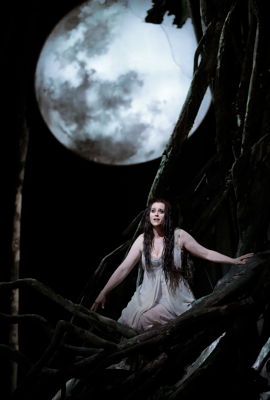
Rachel Willis-Sørensen in the title role of Dvořák's 'Rusalka' at San Francisco Opera. Photo © 2019 Cory Weaver
Once she served notice, she went on to powerful, urgently beautiful singing in her extended duet with the Prince, and she pled her case to Ježibaba to become human most persuasively. When she matures and becomes resigned to her fate, Rachel found unbearable pathos and heart wrenching decisions in the tragic Act Three. Her dramatic journey was superbly communicated, and her singing was effortlessly radiant and assured throughout. Moreover, she is possessed of an appealing physicality.
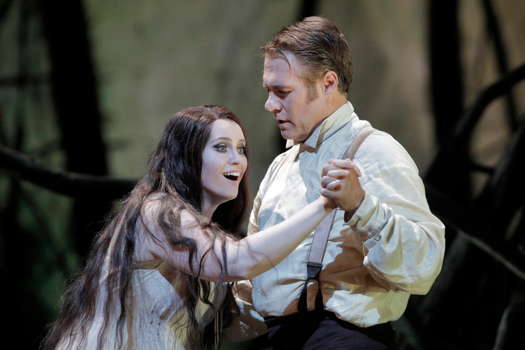
Rachel Willis-Sørensen in the title role of Dvořák's 'Rusalka' with Brandon Jovanovich as the Prince at San Francisco Opera. Photo © 2019 Cory Weaver
Happily, every principle singer was up to her thrilling standard. Having not heard the excellent tenor Brandon Jovanovich for some years, I wondered if time and the heavy repertoire he has been consistently singing might have altered his prodigious gifts. I need not have worried. Mr Jovanovich still brandishes a meaty voice of ringing beauty, and he sounded vibrant and fresh from first to last. Brandon can still melt your heart with torturously lovely phrases one minute, and then pin your ears back with searing, arching outbursts the next. And to boot, he is still boyishly handsome, not a bad attribute for a fairytale Prince.
In the key role of the Water Goblin Vodnik, burly Kristinn Sigmundsson used his imposing physical presence to knowing advantage, and he poured out steely, solid pronouncements that were at once chilling and resonantly appealing. This international star prowls world stages in this part, and his total mastery in this production shows his wealth of experience.
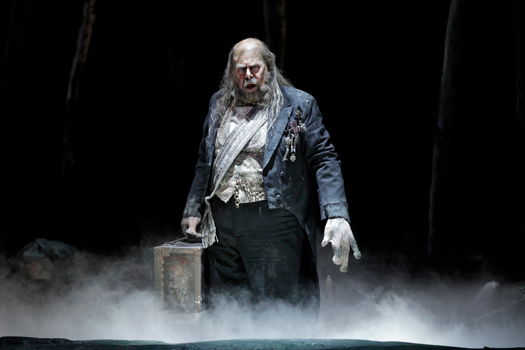
Kristinn Sigmundsson as the Water Goblin Vodnik in Dvořák's 'Rusalka' at San Francisco Opera. Photo © 2019 Cory Weaver
The Foreign Princess is a tough role to crack, and soprano Sarah Cambidge was wholly successful. First, she sang the spots off the page and limned her many arching barbs and insinuations with an acidic beauty. The hint of metal in Ms Cambidge's plump, rangy soprano is just the right fit for the role's demands. She is also able to utilize her regal beauty to make it almost ('almost') plausible that the Prince would throw over Rusalka for the opera's least sympathetic character. It is quite a balancing act and Sarah achieved it.
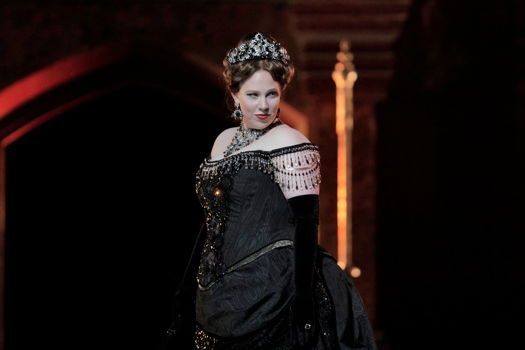
Sarah Cambidge as the Foreign Princess in Dvořák's 'Rusalka' at San Francisco Opera. Photo © 2019 Cory Weaver
The mezzo force of nature that is Jamie Barton made a musical meal out of the multi-faceted Ježibaba. Ms Barton has one of the most remarkable instruments of our time, and she could have been content to merely singing the living hell out of a plum part. But she did much, much more than that: she mewed, she cooed, she spewed, she stewed and on occasion, she squeaked or grunted for dramatic effect. Hers was an uncommonly varied traversal of this colorful part.
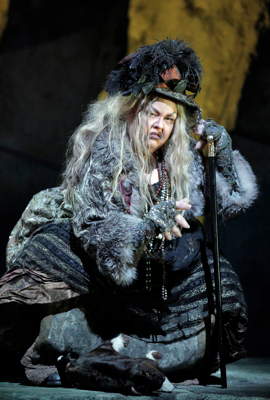
Jamie Barton as Ježibaba in Dvořák's 'Rusalka' at San Francisco Opera. Photo © 2019 Cory Weaver
The sterling trio of Wood Nymphs was peopled by the ready-for-prime-time Adler Fellow vocalists Natalie Image (soprano, First Wood Nymph), Simone McIntosh (mezzo, Second Wood Nymph), and Ashley Dixon (mezzo, Third Wood Nymph). The three contributed singing of full-throated abandon, shining in solo declamations, and blending enchantingly as a unit.
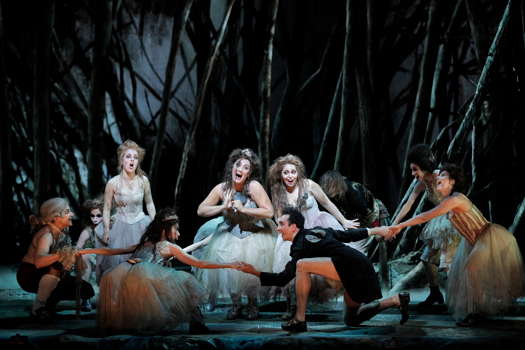
Simone McIntosh, Ashley Dixon and Natalie Image as the Wood Nymphs in Dvořák's 'Rusalka' at San Francisco Opera. Photo © 2019 Cory Weaver
Philip Horst was an especially effective Gamekeeper, his hectoring, secure bass-baritone full of character, and he made his fearful transformation meaningful and interesting. The Kitchen Boy was beautifully rendered by mezzo Laura Krumm, whose sassy, assured petulant chirping was accompanied by some particularly piquant stage business. When her fate turned downward, Ms Krumm became appealingly pitiable. As the Hunter, baritone Andrew Manea's few lines fell easily on the ear.
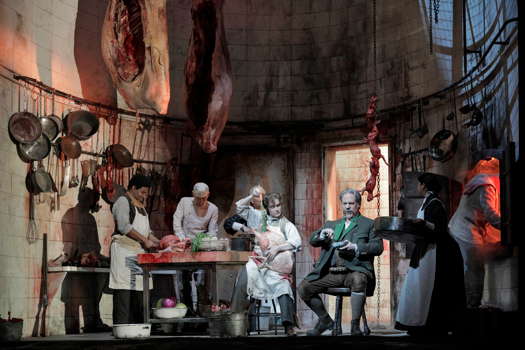
Laura Krumm as the Kitchen Boy and Philip Horst as The Gamekeeper in Dvořák's 'Rusalka' at San Francisco Opera. Photo © 2019 Cory Weaver
And the orchestra, oh, that resplendent house orchestra! The accomplished Korean conductor Eun Sun Kim was making her SFO debut in the pit, and the diminutive dynamo scored an achievement that was every bit as breath taking as her star soprano. Not only did Maestra pace the evening flawlessly, not only did she luxuriate in the languid ensemble stretches, not only did she inspire characterful solo playing that was in total support of the drama, but she also led a forward-moving, crackling, relentless performance that held a rapt audience riveted from first to last.
The physical production is everything that could be desired to fill the massive stage of an international opera house. John Macfarlane's evocative set begins life in a tangled wood at a clearing where a massive cement dam stage left provides the reason for the pond of water in front of it. Ježibaba's house sits right, smoking and opening at appropriate times. The snarl of upstage trees parts to reveal the moon and the mood lightens, brightening even more by the time of the love duet.
The world 'on land' in Act Two is harshly different. The first scene is in the mansion's imposing, cramped, earthy kitchen, with a bloody meat carcass hanging over the proceedings. After an exterior façade flies in and a scene is played 'in one', the façade goes away to reveal a copiously antlered hunter's lodge that is an overwhelming, very 'mortal' environment to counterbalance Rusalka's watery, spiritual origins.
Moritz Junge has contributed an array of immeasurably appealing costumes that range from magical woodland spirits, to the witch and her minions, to the richly attired royalty, and to the rustic peasants that serve them. It is hard to overpraise the varied, variegated lighting design by David Finn. Shifting moods were well served by Mr Finn's choices and he was especially adept at isolating key moments with pointed effects. Overall, the entire design was evidently a dream team effort of unified purpose.
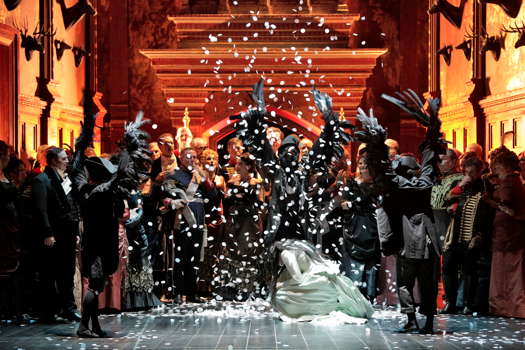
Rachel Willis-Sørensen in the title role of Dvořák's 'Rusalka' with members of the San Francisco Opera Chorus and Dance Corps. Photo © 2019 Cory Weaver
Revival stage director Leah Hausman was re-staging David McVicar's production, and she can claim considerable success. The unique conceit of the tale being imagined or dreamt by the Prince is set forth in a pantomime during the opening bars. I am not sure what it added, but it did color our reaction to whether all of this was the Prince's dream (and death wish) or not. Personally, I think it would have worked just as well without that bit.
Still, the individual characters were so well drawn, the relationships so honest, the shifting movement so spontaneous and eye-pleasing (thanks to choreographer Andrew George and his corps for their contributions), and the audience engagement so palpable, that Ms Hausman is to be heartily commended for this masterpiece of a performance.
I have the feeling that years from now, people will still be saying 'I was there' when these Rusalka peformances come up in conversation. Bravi tutti!
Copyright © 30 June 2019
James Sohre,
Nevada, USA



